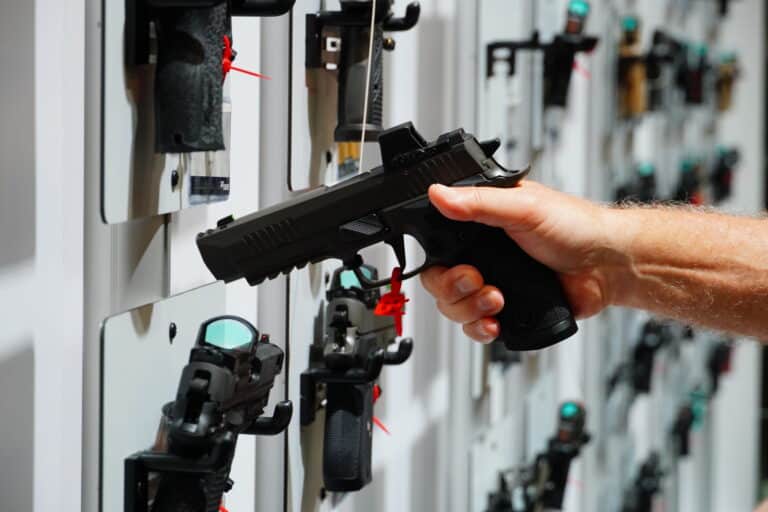With Kamala Harris’s place at the top of the Democratic ticket this November all but guaranteed, attention has now turned to who she plans to tap as the party’s vice-presidential nominee.
Despite some conflicting reports about who exactly is currently being vetted by the Harris campaign for the job, a consensus is emerging around a handful of perceived moderate Democrats as being the likely choices. The current Vice President’s stance on guns is well-established, and she has already signaled that she plans to run on strict gun control. But how do those on her presumed short-list of candidates balance out or accentuate her view on guns?
Josh Shapiro – Pennsylvania Governor
Shapiro was elected Governor of Pennsylvania after serving six years as the state’s Attorney General. In 2022, he staked his gubernatorial campaign on “closing the ghost gun loophole, enacting universal background checks, and passing stronger red flag laws in Pennsylvania.” All of the major gun-control groups endorsed his candidacy, including Giffords, who called him a gun safety champion.
Two of those proposals—universal background checks and red flag legislation—passed Pennsylvania’s Democratically-controlled House of Representatives last year with Shapiro’s support. However, they ultimately failed to advance through the state’s Republican-controlled Senate. He has also expressed an openness to signing a so-called assault weapons ban, targeting guns like the AR-15, despite not campaigning on the proposal.
In his role as Attorney General, Shapiro attempted to curtail access to some firearms through litigation. That effort included suing to block blueprints for making homemade firearms from being allowed online in 2018.
“Tonight, I went to court to prohibit access to new 3D-printable guns in PA,” he wrote in a July 2018 social media post. “These downloadable firearms were just about to be widely available online. It’s an existential threat to our state & we stepped in to stop it.”
He also often signed on to amicus briefs with fellow Democratic AGs to defend gun-control laws stricter than those in Pennsylvania, including California’s ban on semi-automatic long guns for adults under the age of 21 and New York’s “may-issue” gun permitting regime that was found unconstitutional by the Supreme Court in 2022.
Mark Kelly – Arizona Senator
Kelly is a former Navy combat pilot and NASA astronaut who entered politics with an election to the US Senate in 2020 after unseating Republican incumbent Martha McSally.
He is married to former Arizona congresswoman Gabrielle Giffords (D.), who was severely injured after being shot by an attempted assassin in 2001. Giffords and Kelly later co-founded the country’s second-largest gun-control group, named after the former congresswoman.
Kelly has sought to style himself as a moderate on the issue of guns, repeatedly emphasizing that he supports the Second Amendment and is personally a gun owner. However, he has also been an outspoken supporter of stricter gun laws. Kelly has backed universal background checks, red flag laws, and even an assault weapons ban. He was one of 65 Senators to vote in favor of the 2022 Bipartisan Safer Communities Act, which included the first new addition to the federal list of people (namely dating partners convicted of misdemeanor violent acts) who can’t own guns in nearly three decades.
“We have some of the most permissive gun laws in the world, and we have some of the highest levels of gun violence,” he told CBS in an interview last year. “We passed this Bipartisan Safer Communities Act. It is a step in the right direction, but it’s only one step, and there is more we can do.”
He later co-sponsored the GOSAFE Act, a novel attempt at legislation to ban popular semi-automatic firearms such as the AR-15, with three fellow Democratic Senators last November.
After the Supreme Court struck down the ATF’s Trump-era bump stock ban in June, Kelly publicly called for legislation to ban the devices.
“Banning bump stocks is common sense,” he wrote on social media. “They make semi-automatic guns even deadlier, and as a gun owner and someone who knows personally the damage a gun can do, I will always support efforts to protect Americans from the most dangerous weapons and devices.”
Roy Cooper – North Carolina Governor
A two-term elected Democrat in an otherwise Republican-controlled state, Cooper has held the Governor’s mansion in North Carolina since 2016. In that time, Cooper has been an outspoken advocate for strict gun control.
He advocated for universal background checks, red flag laws, and an assault weapon ban in the aftermath of the Uvalde school shooting in 2022.
“A strong Universal Background Checks law is now sitting in the US Senate,” Cooper said at the time. “Pass it and the President will sign it. And while they’re at it, they should ban assault weapons. Until they do, state legislators should close North Carolina’s permit loophole for these weapons. Pass it and I’ll sign it. I’ve proposed a red flag law that lets judges take guns away from violent criminals and people who are severely mentally ill. Pass it and I’ll sign it.”
With Republican super-majorities in the North Carolina state legislature currently, Cooper has had limited ability to pursue his gun priorities. Although, there are a few notable exceptions.
He created an Office of Violence Prevention to ensure a “public health approach” to firearm misuse and launched a statewide safe storage initiative by executive order in 2023. He also twice vetoed legislation to repeal North Carolina’s pistol purchase permit requirement, though lawmakers overrode his objection the second time.
Andy Beshear – Kentucky Governor
The Democratic Governor of ruby-red Kentucky since 2019, Beshear has perhaps the most moderate track record on guns of any of his fellow Vice-Presidential front-runners.
He called for the state to adopt red-flag legislation following a mass shooting at a Louisville bank last year, which claimed the life of one of the Governor’s personal friends.
“Everyone should be able to defend themselves and their family,” Beshear said during a debate last October. “But I’ve now understood, seen, and felt what it’s like to lose someone you love and care about in this city to gun violence.”
However, he vocally opposed an assault weapon ban during his initial run for Governor and hasn’t called for one in his second term either. As the state’s Attorney General in 2017, Beshear even joined an amicus brief arguing against the constitutionality of Maryland’s assault weapon ban.
While he has not endorsed or vocally supported many pieces of pro-gun legislation, he has allowed several to become law without his signature. That includes a bill to ban the use of specialized Merchant Category Codes for gun retailers, a measure declaring Kentucky a “Second Amendment Sanctuary,” and a bill allowing schools to arm staff who meet certain criteria.






